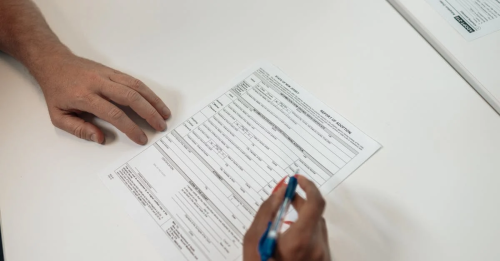A pivotal skill for any essay writer is mastering the art of transitioning seamlessly between ideas. Transitions are the linguistic bridges that connect disparate thoughts, enhancing the flow and coherence of your narrative.
A particularly potent tool in your essay arsenal is the bridge sentence.
This type of sentence acts as a connector between paragraphs or sections, effectively summarizing what has been discussed and hinting at what’s to come. Not only can it counter potential objections, but it also opens the door to new viewpoints.Utilizing bridge sentences can fortify the structure of your essay and smoothly lead your reader through your arguments.
Understanding the Concept of a Bridge in Essay Writing
A bridge sentence is a type of transition that connects two ideas or paragraphs in a logical and smooth way. It can help you create a strong structure for your essay and guide your reader through your argument.
Definition of a Bridge
A bridge sentence, also known as a paragraph bridge or a bridge statement, is a sentence that links two paragraphs or sections of an essay. It usually appears at the beginning of a new paragraph, and it serves as a summary of the previous point and a preview of the next point. It can also address a counterargument or introduce a new perspective.
A bridge sentence can be composed of three elements: a pointer word that directs the reader’s attention to the previous paragraph, a part that refers to the previous point, and a part that relates to the current point. For example, consider this bridge sentence:This advantage makes an inkjet printer one of the best choices for home offices. But besides reasonable prices and printing quality, it is also worth mentioning how easy it is to use inkjet printers.The pointer word “this” points to the previous paragraph, where the advantage of an inkjet printer was discussed.
The part “makes an inkjet printer one of the best choices for home offices” summarizes the previous point. The part “but besides reasonable prices and printing quality, it is also worth mentioning how easy it is to use inkjet printers” introduces the topic of the current paragraph, which is the ease of use of inkjet printers.
The Purpose of a Bridge in an Essay
The purpose of a bridge sentence in an essay is to help the writer connect ideas and transition smoothly from one point to another. A bridge sentence can have several benefits for the essay and the reader, such as :
- It can clarify a point that has been made, by restating it in a different way or providing more details.
- It can introduce a new idea, by showing how it is related to the previous idea or how it differs from it.
- It can sum up the main points of the essay, by highlighting the most important arguments or evidence.
- It can keep the reader’s attention focused on the essay, by creating a logical flow of ideas and avoiding abrupt changes of topic.
- It can make the writing style more fluid and coherent, by using words and phrases that create a smooth transition between ideas.
Examples of Bridges in Different Types of Essays
Whether you are composing a rhetorical analysis essay, a double spaced essay, a problem and solution essay, or any other genre, the incorporation of a bridge sentence is elemental in its function and purpose. Subsequent examples will illustrate their usage in different contexts.
Argumentative Essays
Rooted in debate, the argumentative essay forwards a claim, backing it with solid evidence and logical reasoning. Its ultimate goal? To sway the reader toward the writer’s perspective or spur them into action.
Take this bridge sentence as an example: “While social media serves as a formidable platform for communication and learning, it’s not without its drawbacks on mental health and personal well-being.” This sentence acknowledges social media’s benefits before transitioning to its adverse effects, the essay’s primary focus. It even suggests moderation and responsible use as potential remedies, paving the way for further discussion.
Expository Essays
The expository essay enlightens its audience, offering a clear, factual account of its subject. It’s the educator among essays.
A bridge sentence here might encapsulate the preceding paragraph’s main point, link two related concepts, or unveil a new topic. For instance: “The Golden Gate Bridge, an engineering wonder, stands as an iconic beacon across the San Francisco Bay, bridging the gap between San Francisco and Marin County.” This sentence transitions smoothly from discussing the bridge’s construction to its emblematic value, maintaining the informative tone crucial to expository essays.
Narrative Essays
A narrative essay’s charm lies in its storytelling, inviting readers into the writer’s personal experiences and associating them with the emotional journey detailed.
Consider this bridge sentence for generating anticipation or segueing scenes: “Crossing the narrow bridge, the stunning view below—sunlit river, rustling trees—filled me with an elation, blissfully ignorant of the impending peril beyond.” It not only builds suspense but also serves as a seamless transition, enriching the narrative flow.
Descriptive Essays
Descriptive essays paint a picture, detailing subjects so vividly that readers can visually experience the discussed topic. A bridge sentence in this form sharpens focus, draws comparisons, or highlights transitions.
For example: “Beside the ancient, graffiti-laden bridge, a testament to years passed, stood its modern counterpart—sleek, shimmering, an architectural marvel—promising a new era.” This bridge sentence contrasts the two structures effectively, using evocative language to kindle the readers’ imagination while signaling a transition in time and technology.
How to Craft an Effective Bridge: Tips and Techniques
A bridge sentence can help you create a strong connection between your hook and your thesis statement, ensure a smooth transition and cohesion between your paragraphs, and avoid some common mistakes that can weaken your essay.
Linking the Hook and the Thesis Statement
A hook is the first sentence of your essay that grabs the reader’s attention and makes them want to read more. A thesis statement is the last sentence of your introduction that states the main argument or purpose of your essay.
A bridge sentence can help you link these two elements by summarizing the hook and introducing the thesis statement. For example, consider this hook, bridge, and thesis statement:
Hook: Have you ever wondered why some people are afraid of spiders, while others are fascinated by them?
Bridge: Spiders are among the most diverse and intriguing creatures on the planet, but they also evoke different emotions and reactions from humans.
Thesis statement: In this essay, I will explore the reasons behind the fear of spiders, the benefits of overcoming this phobia, and the ways to cope with it.
The bridge sentence connects the hook and the thesis statement by providing some background information on spiders and their relationship with humans. It also creates a smooth transition from a general question to a specific topic.
Ensuring Smooth Transition and Cohesion
A smooth transition and cohesion between your paragraphs can make your essay more clear and logical. A bridge sentence can help you achieve this by linking the main idea of the previous paragraph to the main idea of the next one.
You can use different types of transitions, such as sequential, contrastive, causal, or additive, depending on the relationship between your ideas. You can also use words and phrases that create a smooth transition, such as but, and, besides, even so, further, moreover, nevertheless, still, therefore, thus, although, and yet. For example, consider this bridge sentence:
Although the fear of spiders is a common and natural response, it can also have negative consequences for the individual and the society.
This bridge sentence uses a contrastive transition (although) to show the difference between the previous paragraph, which explained the causes of the fear of spiders, and the next one, which will discuss the effects of this fear.
Common Mistakes to Avoid when Writing a Bridge
When writing a bridge sentence, you should avoid some common mistakes that can weaken your essay and confuse your reader. Here are some of them :- Do not repeat the same idea or information that you have already stated in the previous paragraph or the thesis statement.
Instead, restate it in a different way or provide more details.- Do not introduce a new idea or topic that is not related to the previous or the next paragraph. Instead, focus on the connection between the two ideas or topics.- Do not make the bridge too long or too short.
A good bridge should be brief and to the point, but also clear and informative.- Do not use vague or ambiguous words or phrases that can confuse the reader or create a weak transition. Instead, use specific and precise words or phrases that create a strong transition.
FAQ
How do you write a bridge in an essay?
To write a bridge in an essay, it’s important to connect the main idea of the previous paragraph with the main idea of the next paragraph. This is achieved by employing a pointer word or phrase that references the previous point, followed by introducing the new point with a relevant word or phrase.
For example: “The inkjet printer is the most popular type of printer for home use. It is less expensive than a laser printer and produces good-quality prints.”
This advantage makes an inkjet printer an excellent choice for home offices. Besides reasonable prices and printing quality, it’s also essential to highlight the ease of use of inkjet printers. Here, the bridge sentence uses “this advantage” to reference the previous paragraph, while “but besides reasonable prices and printing quality, it is also worth mentioning” introduces the new point.
What is an example of a bridge sentence?
An example of a bridge sentence connects two paragraphs or ideas by summarizing the previous one and introducing the next. For instance, “While the inkjet printer is a popular choice for home use, it has some drawbacks that make it unsuitable for large-scale printing.”
How is the word bridge used in the essay?
The word bridge in an essay refers to a transitional device that connects two ideas or paragraphs. It aids the author in maintaining a smooth flow of thoughts and in illustrating the relationship between points.
What is a bridge used for in writing?
In writing, a bridge is used to link two separate ideas together and to ensure a smooth transition between them. A bridge can manifest as a sentence or a phrase that summarizes the previous idea, introduces the new idea, or contrasts the two ideas.
Homework Help Service: Help for Homework
As the best homework help service available, we at helpforhomework pride ourselves on delivering top-notch essays that guarantee success. Our team of experienced writers is dedicated to providing you with high-quality, well-researched, and custom-written papers that meet your unique requirements. Whether you need assistance with a challenging topic or a tight deadline, HelpForHomework is here to support you every step of the way. Don’t settle for mediocre results – place your order with us today and experience the difference of working with the best homework help service for all your essay needs.



